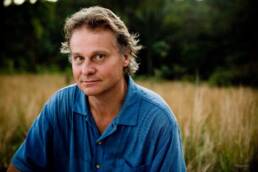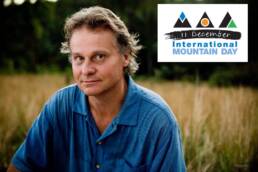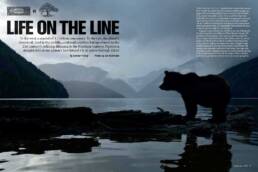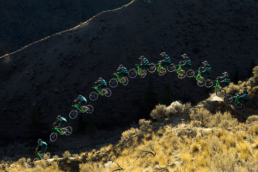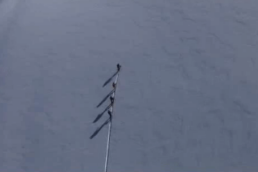Wade Davis, the author of Wade Davis: Photographs, has just received the 2017 George Ryga Award for Social Awareness in Literature.The $2,500 literary prize, named for the 20th Century Canadian novelist, recognizes a British Columbia writer who has achieved an outstanding degree of social awareness. We revisit his wildly exploratory work in this article, which first appeared in Coast Mountain Culture #2.
Wade Davis is a 63-year-old ethnographer, anthropologist, ethnobotanist, writer, photographer, filmmaker and an explorer-in-residence at the National Geographic Society. He’s also a professor of anthropology at the University of British Columbia. Born in Vancouver, Davis spent his early career working as a logger on Haida Gwaii and also as a park ranger, river guide and hunting guide in the Spatsizi Plateau wilderness area. Then it got weird. Here’s a snapshot of his many accomplishments over the past forty years.
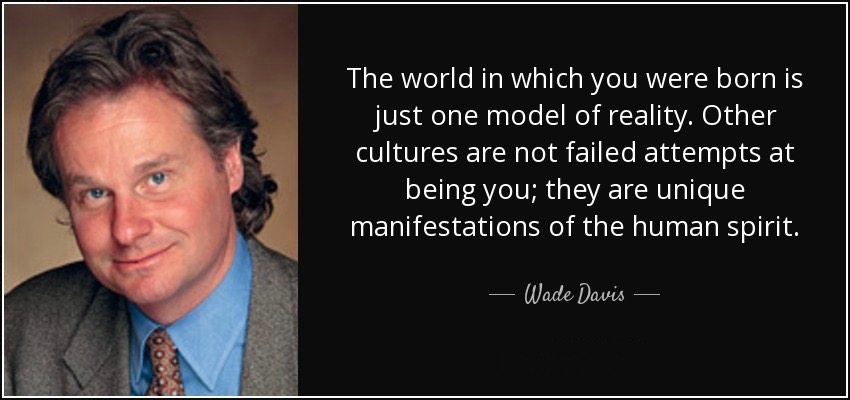 1974
1974
Davis begins an academic journey at Harvard University, where he admits he “spent most of my first year writing pamphlets and smashing windows . . . demonstrating [against the Vietnam War].” His education at Harvard spans decades and nets him degrees in anthropology and biology, and a Ph.D. in ethnobotany.
At the age of 20, Davis accompanies celebrated English author and explorer Sebastian Snow as he crosses the Darién Gap on foot, an infamously hostile, 160-kilometre-long tract of land between Panama and Colombia. Snow documents the journey in his 1976 book Rucksack Man.
Davis travels to the Andes for the first of many times to unravel the mysteries of the coca plant, from which cocaine is derived from. He spends over three years in the Amazon and Andes, living among 15 tribal groups in eight Latin American nations. It is here he will try the powerful hallucinogen ayahuasca for the first of many times.
1982 – 1985
Davis travels to Haiti to study real-life zombies, humans previously thought to have been brought back from death by Voodoo ritual. He hypothesizes zombies could be created through the administration of two powders into the bloodstream: the first containing tetrodotoxin (TTX), a powerful and frequently fatal neurotoxin found in the flesh of the pufferfish, and the second a paste made from datura stramonium, that place the individual in a psychosis, as well as by the social and cultural beliefs of the Voodoo. He writes two books on the subject, Passage of Darkness (1988) and The Serpent and the Rainbow (1985), a bestselling book later adapted to motion picture. Davis receives approximately $250,000 for the rights, which he puts towards his research for his Ph.D. Amidst controversy, he receives his doctorate from Harvard.
1992 – present
As a documentary filmmaker who has made over 20 films, Davis’s work has appeared in 165 countries on the National Geographic channel. Most recently, he is the principal character in Grand Canyon Adventure, an IMAX film currently screening in 55 countries. For the pop culture connoisseurs, Davis’s work also inspired three episodes of The X-Files.
2008
From Canada to the Amazon, Davis travels exhaustively in the footsteps of his mentor Richard Evans Schultes and experiments with different substances including peyote, magic mushrooms, morning glory seeds, LSD and ayahuasca. The resulting two-hour film, Peyote to LSD: A Psychedelic Odyssey, explores the cultural significance of psychedelic substances over the course of mankind’s existence.
2009
Davis delivers the CBC Massey Lectures on his book The Wayfinders: Why Ancient Wisdom Matters in the Modern World. Previous lecturers have included Noam Chomsky, Margaret Atwood and Martin Luther King Jr.
2011
Davis simultaneously releases two books: The Sacred Headwaters, and Into the Silence: The Great War, Mallory, and the Conquest of Everest, an exploration into Everest and a “timeless portrait of an extraordinary generation of adventurers, soldiers, and mountaineers.” The latter involves a decade of research.
2017
Wade Davis has now authored 19 books and his photographs have been widely exhibited and showcased in such magazines as National Geographic and Outside. In 2016 he became a Member of the Order of Canada and is currently a professor of Anthropology at UBC. He will be presented the George Ryga Award at an official ceremony on June 29, 2017, at the Vancouver Public Library.
Related Stories
Wade Davis Keynote for International Mountain Day
December 11th is International Mountain Day and to celebrate, Kootenay and Coast Mountain Culture magazines are joining…
CMC Feature Series – Life On The Line
To the west, a market of 1.5 billion consumers. To the east, the planet’s dirtiest oil. And in the middle, a colossal…
Life Cycles Almost Done
KMC Editor Mitchell Scott has been working as a story consultant and script writer for the Stance Film Crew for the…
A Life Ascending – Trailer
A new movie about the legendary Selkirk Experience guide, Ruedi Beglinger. Click the photo to check out the trailer. Or…
Life Cycles Is Almost Here
It's a decidely home-grown effort that will change the mountain bike film genre - and perhaps actions sports in general…
Life Cycles – Getting There
Sure, I might be biased, seeing as I'm helping the guys at Stance Films with their narration script and story…


